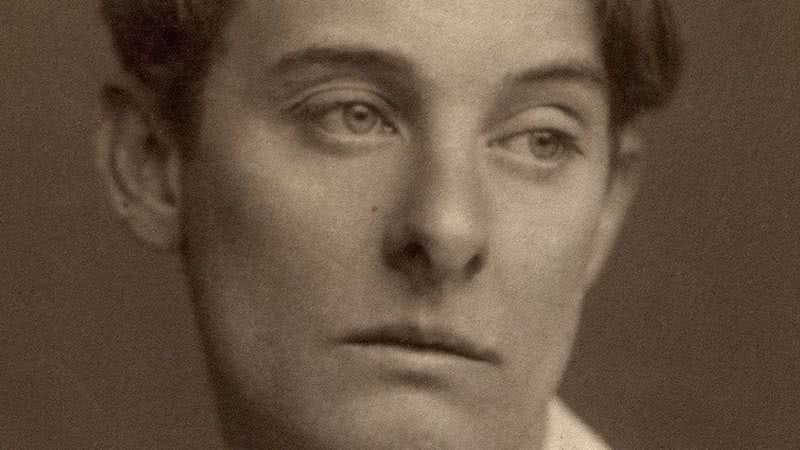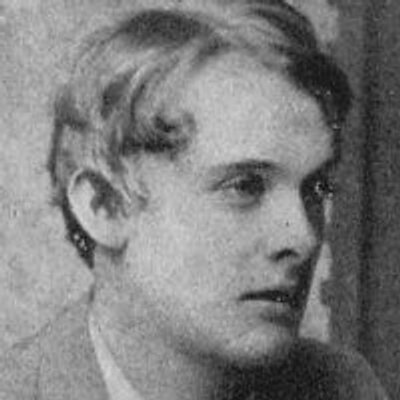

But he that was his comrade walked aside He was full sad and sweet, and his large eyes Were strange with wondrous brightness, staring wide With gazing and he sighed with many sighs That moved me, and his cheeks were wan and white Like pallid lilies, and his lips were red Like poppies, and his hands he clenched tight, And yet again unclenched, and his head Was wreathed with moon-flowers pale as lips of death. The one did joyous seem And fair and blooming, and a sweet refrain Came from his lips he sang of pretty maids And joyous love of comely girl and boy, His eyes were bright, and 'mid the dancing blades Of golden grass his feet did trip for joy And in his hand he held an ivory lute With strings of gold that were as maidens' hair, And sang with voice as tuneful as a flute, And round his neck three chains of roses were. See from the South Comes the pale pageant that hath never an end.' And lo! within the garden of my dream I saw two walking on a shining plain Of golden light. And he came near me, with his lips uncurled And kind, and caught my hand and kissed my mouth, And gave me grapes to eat, and said, 'Sweet friend, Come I will show thee shadows of the world And images of life. And as I stood and marvelled, lo! across The garden came a youth one hand he raised To shield him from the sun, his wind-tossed hair Was twined with flowers, and in his hand he bore A purple bunch of bursting grapes, his eyes Were clear as crystal, naked all was he, White as the snow on pathless mountains frore, Red were his lips as red wine-spilith that dyes A marble floor, his brow chalcedony. o'ergrown with velvet moss Uprose and gazing I stood long, all mazed To see a place so strange, so sweet, so fair. And there were curious flowers, before unknown, Flowers that were stained with moonlight, or with shades Of Nature's willful moods and here a one That had drunk in the transitory tone Of one brief moment in a sunset blades Of grass that in an hundred springs had been Slowly but exquisitely nurtured by the stars, And watered with the scented dew long cupped In lilies, that for rays of sun had seen Only God's glory, for never a sunrise mars The luminous air of Heaven.

There were pools that dreamed Black and unruffled there were white lilies A few, and crocuses, and violets Purple or pale, snake-like fritillaries Scarce seen for the rank grass, and through green nets Blue eyes of shy peryenche winked in the sun. Carroll & Graf, 2007.I dreamed I stood upon a little hill, And at my feet there lay a ground, that seemed Like a waste garden, flowering at its will With buds and blossoms. Oscar Wilde: His Life and Confessions. United States, Brentano's, 1916. The two reunited in August 1897 in Rouen, but parted ways for good a few months later. Yet, Wilde continued to write letters to Lord Douglas throughout the years. Oscar Wilde's trials in 1895 caused a rift in their relationship as Wilde was imprisoned and spent a few years abroad after he was released. Wilde responded to Queensberry's words by accusing the Marquess of libel and sparking legal trials. When he sent Wilde a note calling Wilde a "posing Somdomite," which is a misspelling of Sodomite.

The 9th Marquess of Queensberry knew of Wilde and his son's closeness and repeatedly sent threats. One of the products of this time would eventually become The Importance of Being Earnest. Wilde began writing more frequently to try and make up his debt due to the expensive relationship. In January 1895, they went to Algiers together. The two would often meet up together and would even go on trips. As both were literary talents, they were drawn to each other and started an affair.ĭespite Lord Douglas's position as a noble, Wilde would indulge in his lover, eventually outspending the amount that he made. Lord Douglas was the third son of the 9th Marquess of Queensberry and an undergraduate student at Oxford at their first meeting. In June of 1891, Wilde met Lord Alfred Bruce Douglas.


 0 kommentar(er)
0 kommentar(er)
